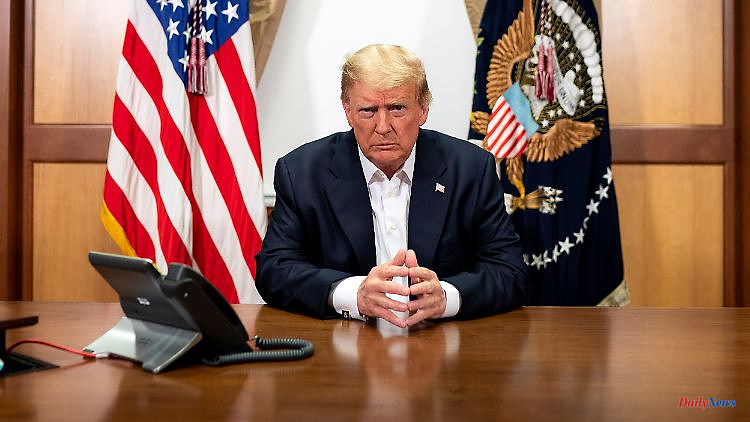For a long time, Donald Trump has resisted the publication of his tax documents. But now the Finance Committee of the US House of Representatives has released thousands of documents belonging to the ex-President. The data provides a detailed insight into the Republican's financial management.
Donald Trump's released tax returns reveal new details about the ex-US President's finances. Trump therefore had a bank account in China during his tenure, as reported by several US media, including broadcaster CNN, after reviewing thousands of pages of tax documents. The Republican had publicly denied this. Trump also did not spend anything on charity in 2020, the last year of his term in office - despite promises to the contrary. And: The documents generally show that Trump paid little or no federal income tax for several years, although he always boasted about his wealth.
After years of legal wrangling, the Treasury Committee of the US House of Representatives released several thousand pages of Trump's tax documents from 2015 to 2020 on Friday. For years, the Republican had used legal means to refuse to release his tax returns to the committee - and finally failed in November before the US Supreme Court.
Even before the publication of the extensive original documents, the committee had released key figures from Trump's tax returns for the six years from 2015 to 2020 - i.e. from the time just before and throughout his term as president. Accordingly, in 2016, the year he was elected, and in 2017, his first year in the White House, Trump paid only $750 each, just under €700, in federal income tax and claimed high losses. In 2018 he reported millions in profits and paid almost one million dollars in income tax, in 2019 his tax was around 133,000 dollars. In the last year of office, 2020, Trump paid no federal income tax at all.
The "New York Times" had already reported in the middle of the election campaign before the 2020 presidential election that Trump only paid $750 in federal income tax in 2016 and 2017. This was made possible by write-offs and credits, among other things because of high losses. Trump denied that at the time, claiming he paid "millions."
Research teams from US media combed through the several thousand pages of original documents on Friday to find more details. CNN and others reported that Trump had reported a bank account in China for the years 2015 to 2017, among other things. In a television debate during the 2020 presidential election campaign, however, Trump stated that the account in China had already been closed in 2015. CNN also reported that in the filings, Trump said he paid far more taxes abroad than he did at home in about 2017 -- nearly $1 million in taxes.
In his six-year tax returns, Trump listed business income, taxes, expenses or other financial items in various countries: including Azerbaijan, Panama, Canada, India, Qatar, South Korea, Great Britain, China, the Dominican Republic, the United Arab Emirates, the Philippines, Georgia, Israel, Brazil, Mexico, Indonesia, Ireland and Turkey. The "New York Times" and others also reported that Trump did not spend anything on charity in 2020 - contrary to his promises. Trump had promised to donate his annual presidential salary of $400,000. The tax documents indicated donations of $500,000 each for 2018 and 2019, $1.9 million for 2017 and nothing for 2020, it said.
It is a bitter setback for Trump that his tax returns are now being publicly dissected. The release comes as he is running to run again for the Republicans in the 2024 presidential election. Contrary to usual practice in the USA, the real estate entrepreneur had not made his tax returns public either as a presidential candidate or after moving into the White House. Critics therefore suspected that Trump had something to hide – also because he used all legal means to prevent the documents from being disclosed.












